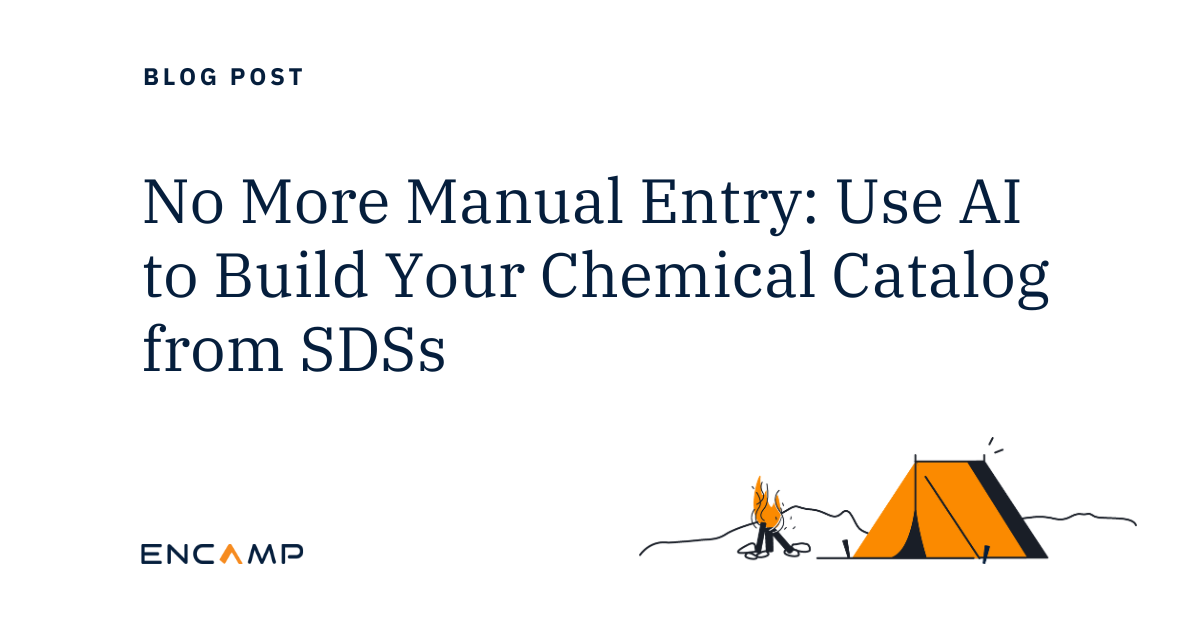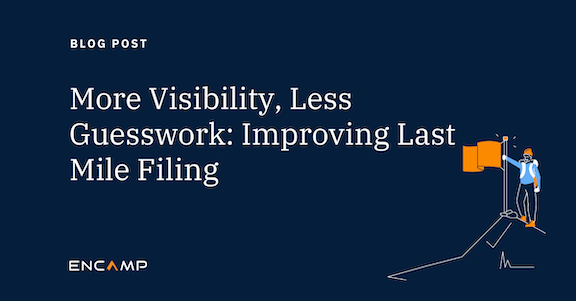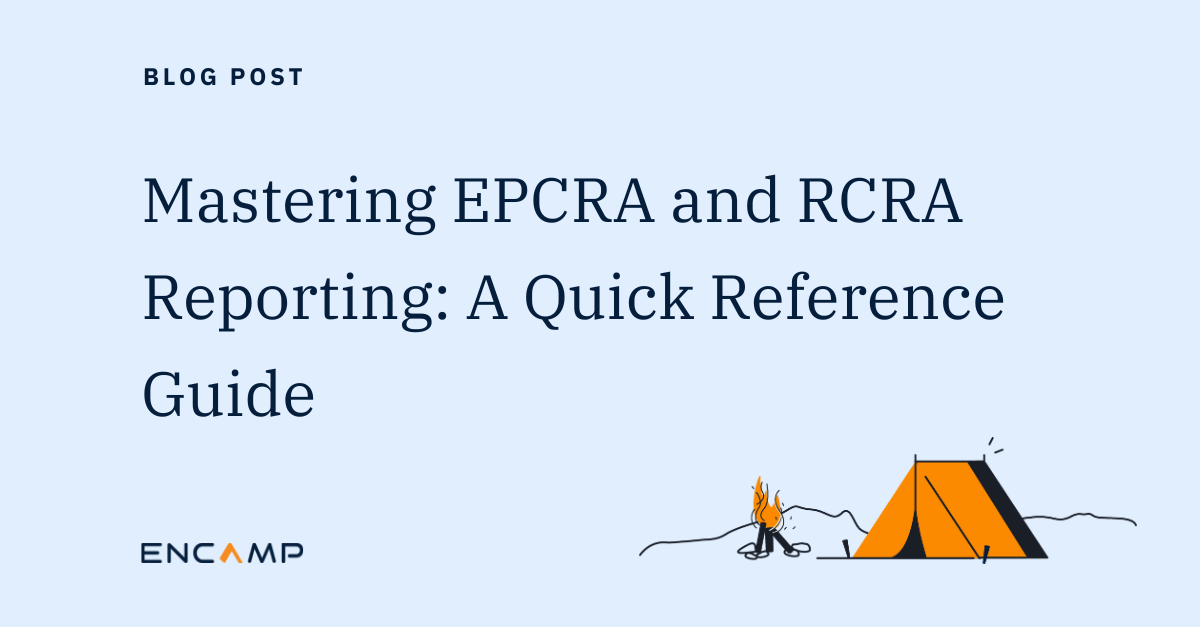Staying in compliance with regulatory requirements is one of the most important concerns for companies who want to reach their sustainability goals. Ever-evolving regulatory standards, coupled with the rapid rise of ESG investing, has put more pressure on environmental professionals to build proactive compliance reporting strategies. Such strategies must encompass collecting data for hazardous chemicals, tracking it for reporting, and ensuring its accuracy and timeliness to avoid non-compliance.
Encamp recently hosted “The Path To Proactive Environmental Compliance” live event featuring a panel of compliance experts to discuss these issues. The panel included Encamp CEO and co-founder Luke Jacobs, together with Bill Pennington, EHS Research Director for Verdantix, and Renee Decker, EH&S Program Engineer at Hexion. The panelists shared their thoughts on the significance of proactive environmental compliance as well as operational excellence and business continuity. Following are five key takeaways from the event.
Environmental compliance: expert insights
On being proactive about compliance issues
“You need to have a system that allows you to collect that information before it’s a fire drill.”
As Luke pointed out, the EHS industry has typically always been reactive to potential compliance issues. If you or your team spend more time putting out fires rather than making sure there aren’t any flammable materials to start one, it’s time to explore more proactive strategies in your approach to environmental compliance management.
Being proactive goes beyond just knowing what to do. It also means knowing which information you need and where it will come from. Compliance management software (such as Encamp) aids EHS teams by centralizing their information streams into a single source of truth so that when EPCRA and Tier II season comes along, they are confident and ready to submit their reports.
On tackling business continuity challenges
“It’s reputational damage, it’s loss on advertising that we’ve spent years building to establish a brand, it’s loss of stakeholder trust, and it’s operationally specific costs like stoppage time.”
Ever since the pandemic started, “business continuity” and “resilience” has been the buzzword around the C-suite and their organizations. How can you make sure your business can tackle daily business continuity challenges head-on? More importantly, is there a way to proactively protect your business?
Being in a highly-regulated industry, non-compliance risks are not only considered blockers to business continuity but they can also be company killers. Whether it’s not managing your data sufficiently or failing to submit required compliance reports, once the EPA determines your business is in violation of its regulations, you can incur hefty fines. More than the financial burden and potential reputational damage, stakeholder trust may also be lost.
As the panel discussed, many EHS professionals go through this nightmare day in and day out, since staying in compliance plays a big part in ensuring their business continues for many generations to come.
On the rise of ESG
“It helps ensure that we are adequately weighing the EHS part and not just how much product we are pushing out. As an ethical company, we really want to be focused on the environment and sustainability as well.”
As Health and Safety Compliance continues to forge its own path, we are also seeing Environmental Compliance pave a path of its own in the form of Environmental, Social, and Governance (ESG). ESG criteria has allowed environmental professionals to take a well-earned seat at the corporate table equal to other stakeholders because of their quantifiable environmental goals. In particular, an organization’s ESG score is important for investors to measure potential growth, ethical impact, and sustainability.
As Renee Decker shared, as an ethical company, Hexion, Inc. maintains a blueprint of their environmental goals to ensure that each and every one of its employees are aware of what the level of sustainability the company wants to achieve. As we’ve always said, what’s good for business is good for the environment.
On digital transformation and operational excellence
“I’m an environmental person but I need my facilities person to collect data that I need. Being able to communicate to that person why this matters and how you do it and to make it really easy for them to be able to do it and do it right is critical.”
Digital transformation to achieve operational excellence has always gone hand-in-hand. Technology is meant to aid human workers by streamlining and automating labor-intensive tasks.
EHS software is a dime a dozen in this market, but as an environmental compliance professional, you need a system that addresses your particular need. During the event, the panel discussed that this particular solution for environmental compliance will allow you to collaborate with different stakeholders and give visibility to the data you need. Such solutions would alleviate you and your team from complex spreadsheet formulas and having to constantly retrain new hires on non-standardized systems.
On State-level regulatory complexities
“The Biden Administration has really signalled that enforcement is going to increase pretty drastically over the next four years. Some states are proactively leading the charge in enforcing environmental regulations.”
- Bill Pennington, Verdantix
As our CEO Luke Jacobs mentioned during the event, Encamp will also continue to see a continued complexity with environmental regulations, specifically state-level regulations. This scenario makes it harder for companies, such as yours, that have multiple facilities across multiple states and would need to compile their data into one place. Not only that, you would also need to know which specific data or form to report for which state. In addition, more states are slowly adopting digital technologies, so we will be seeing more regulatory agencies requiring digital submissions for reports.
Standardized, simplified reporting wins proactive environmental compliance
Staying proactive with your environmental compliance management goes beyond due diligence when some things go wrong. Again, it’s not about eliminating things that could go wrong, it’s about being prepared and understanding what is needed for compliance management to go right. Streamlined and simplified environmental reporting translates into confident and proactive environmental compliance.
Transforming the way enterprises stay in compliance
Encamp is on a mission to create a world where good for business can equal good for the environment. We help enterprises transform compliance programs and human processes into a technology-driven system that lays the foundation for accurate and ongoing environmental compliance through a blended method of intelligent high-tech solutions and high-touch expert support.
Angelica Castillo
Angelica is the Content Marketing Manager at Encamp. She has a love/love relationship with creative marketing, technology, and true crime shows.



